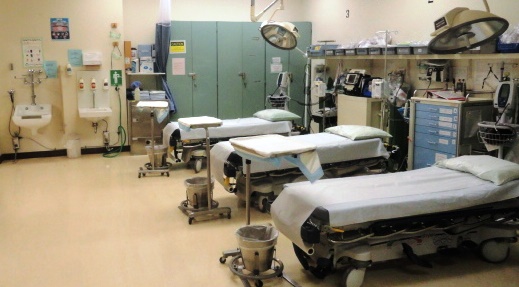A new bill seeks to remove a small, but significant financial barrier for incarcerated Californians seeking medical care.
The bill, AB 45, would eliminate a $5 copay for doctors’ visits in state prisons.
People in lockup do not have to pay the state’s fee if they are indigent and have no money in their commissary account. Additionally, emergency visits and follow-up visits are free.
The copays are aimed at weeding out unnecessary medical visits and repaying local and state governments for inmate medical care.
Unfortunately, the co-pays can also discourage incarcerated individuals from getting the care they need for chronic or contagious illnesses, according to a 2017 report from the Prison Policy Initiative.
Fees even as small as $5 can be prohibitively costly for inmates who make pennies on the dollar working jobs in lock-up. Families of incarcerated people often end up carrying the financial burden of incarceration, paying conviction-related fees, medical copays, phone call charges, money transfer fees, and more–often with a significant loss of household income from their loved ones in prison.
In California, the minimum wage for a prison job is $0.08 an hour. While not all prison jobs pay the lowest hourly wage, at the $0.08 rate, it would take an inmate 62.5 hours to afford one co-pay. In comparison, the cost of a medical co-pay took a non-incarcerated person (making the state minimum wage of $10.50 per hour) 62.5 hours to pay for, the co-pay would be a whopping $656.25.
The National Commission on Correctional Health Care (NCCHC) points out that while states cannot deny inmates medical care when they are unable to pay, “inmates are almost always in an ‘indigent’ mode,” relying on cash-strapped family members to fund their commissaries. And inmates often must use their commissary money for other needs like toiletries, over-the-counter medications like antacids, and feminine hygiene supplies.
The NCCHC also argues that inmates often have limited health literacy, and may not understand that they cannot be denied health services if they can’t afford a copay.
“By removing this unjust, punitive barrier to healthcare, we can ensure that all incarcerated people have access to necessary care, regardless of their ability to pay,” says Assemblymember Mark Stone (D-Monterey Bay), who authored the bill with Assemblymember Reggie Jones-Sawyer (D-South Los Angeles).
Image of the California Medical Facility by the California Department of Corrections and Rehabilitation.


I have a friend who is in prison for something he didn’t do, waiting for a new trial. I know for a fact that he did not do it. He told me today that he is having headaches…. for two weeks now with no meds, and of course he can’t see the nurse, because he has no money for the co-pay. He has also told me not to send him money, because the prison takes 55% of any money that comes in. further: He was tried as an adult at 14 for a felony. That’s been on his record all this time and influenced the court on his sentence.